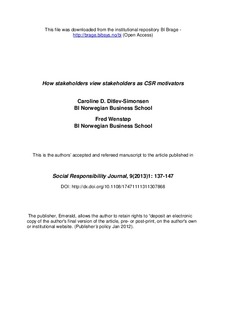| dc.description.abstract | Purpose
This study investigates perceptions of the relative importance of different stakeholders (owners, employees, customers, NGOs and governmental authorities) as agents motivating managers to engage in CSR. The purpose was to determine which stakeholders are viewed as key motivators and which the respondents think ought to be key stakeholders.
Design/methodology/approach
This is an empirical study. Three stakeholder groups – Corporate leaders, MSc business students and NGOs – were consulted through a paper survey (N=264).
Findings
The findings reveal that the three stakeholder groups roughly agree that owners are the main motivators for managers to pursue CSR, followed by customers, governments, employees and NGOs, in that order. We then turned from perceptions of how things are to opinions about how things ought to be, asking who should be the main motivator. In this case, customers moved up to first place, followed by employees, owners, government and NGOs. Age, but not gender, was a significant variable. The older the respondents, the smaller the discrepancy between perceptions of what is and opinions about what ought to be.
Research limitations/implications
This study was conducted in Norway and generalization is therefore limited. By replicating the study in other countries cultural differences can be investigated.
Practical and social implications
The findings are applicable for evaluating different avenues for understanding and influencing managerial and stakeholder CSR behaviour.
Originality/value
Several studies have concluded that stakeholders are of key importance in the CSR setting. However, few studies so far have compared the perceived relative “power” held by stakeholders. This type of knowledge can provide a key to understanding the development of CSR | no_NO |
